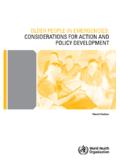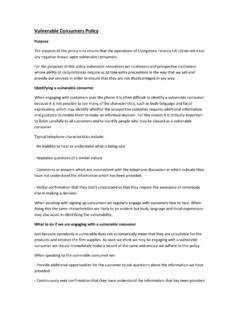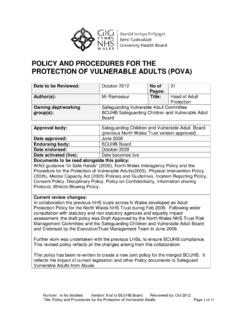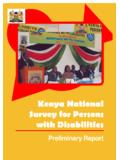Transcription of Mental Health and Development: Targeting People with ...
1 Mental Health and development : Targeting People with Mental Health Conditions as a vulnerable Group Almost three quarters of the global burden of neuropsychiatric disorders occurs in low and middle income countries. We can measure the costs to individuals, families, societies, and economies. And the costs of these disorders, which tend to have an early onset and are chronically disabling, are enormous. Taking action makes good economic sense. These disorders interfere, in substantial ways, with the ability of children to learn and the ability of adults to function in families, at work, and in society at large. Dr. Margaret Chan Director General of the World Health Organization Mental Health : central to human development Positive Mental Health is linked to a range of development outcomes, including better Health status, higher educational achievement, enhanced productivity and earnings, improved interpersonal relationships, better parenting, closer social connections and improved quality of life.
2 Positive Mental Health is also fundamental to coping with adversity. On the other hand, poor Mental Health impedes an individual s capacity to realize their potential, work productively, and make a contribution to their community. Article 32 of the UN Convention on the Rights of Persons with Disabilities requires that: "States Parties recognize the importance of international cooperation and its promotion, in support of national efforts for the realization of the purpose and objectives of the present Convention, and will undertake appropriate and effective measures in this regard .. ensuring that international cooperation, including international development programmes, is inclusive of and accessible to persons with disabilities.
3 "1 2 The social and economic impact of Mental and psychosocial disabilities is diverse and far reaching, leading to homelessness, poor educational and Health outcomes and high unemployment rates culminating in high rates of poverty. All these issues are directly linked to the Millennium development Goals (MDGs). Mental Health conditions and vulnerability Persons with Mental and psychosocial disabilities comprise a vulnerable group for the following reasons:2 They are subjected to high levels of stigma and discrimination, due to widely held misconceptions about the causes and nature of Mental Health conditions. This group also experiences high levels of physical and sexual abuse. This can occur in a range of settings, including prisons and hospitals.
4 They often encounter restrictions in the exercise of their political and civil rights, largely due to the incorrect assumption that People with Mental Health conditions are not able to carry their responsibilities, manage their own affairs and make decisions about their lives. In the majority of countries, People with Mental and psychosocial disabilities are not able to participate fully in their societies by taking part in public affairs, such as policy decision making processes. The majority of People with Mental Health conditions in low and middle income countries are not able to access essential Health and social care. People with severe Mental and psychosocial disabilities are also much less likely to receive treatment for physical illnesses.
5 Emergency relief services also remain inaccessible for this group, in spite of the fact that their situations might worsen during the stress of emergencies. Emergency What is the impact of Mental Health problems? Hundreds of millions of People worldwide have Mental and psychosocial disabilities, including depression, schizophrenia, alcohol use disorders, epilepsy, and Alzheimer and other 80% of persons with Mental Health conditions live in low and middle income countries. 2 Almost one million People die due to suicide every year, and it is the third leading cause of death among young Unipolar depressive disorders, schizophrenia, bipolar disorder and alcohol use disorders are placed among the top ten causes of disability due to Health related conditions in all countries, as well as in low and middle income countries, where they represent a total of % of all disability related to Health 3relief services often are inadequate to address the specific needs of People with Mental and psychosocial disabilities.
6 They also face significant barriers in attending school and finding employment. The exclusion of children with Mental and psychosocial disabilities from education leads to further marginalization of this already vulnerable group. Poor educational outcomes also lead to poor employment opportunities. People with these disabilities experience the highest rates of unemployment of People with disabilities. Due to these factors, People with Mental and psychosocial disabilities are much more likely to experience disability and die prematurely, compared with the general population. Other vulnerable groups have high rates of Mental Health conditions Other vulnerable groups are also at risk of poor Mental Health , for example, marginalization and deprivation can result in poor self esteem, low self confidence, reduced motivation, feelings of hopelessness and isolation.
7 Addressing Mental Health problems in vulnerable groups can facilitate development outcomes, including improved participation in economic, social, and civic activities. What still needs to be done? The response requires a broad integrated strategy to improve Mental Health in low and middle income countries as recommended in WHO s Mental Health and development report:2 Provide integrated Mental and physical treatment and care through primary care. As treatment is affordable and cost effective, all Health services should include a Mental Health component. Integrate Mental Health issues into broader Health policies, programmes, and partnerships to avoid vertical systems of Mental Health services and marginalization of financing and human resources for Mental Health .
8 Integrate Mental Health into services during and after emergencies for People with pre existing Mental and psychosocial disabilities, as well as those who develop chronic Mental Health problems as a result of the emergency, with a medium and long term focus on developing community based services. People with Mental Health conditions have been largely ignored as a target of development efforts. This is despite the high prevalence of Mental Health conditions, their economic impact on individuals affected, their families and communities, and the associated stigmatization, discrimination and 4 Include Mental Health issues within social services development . Establish strong linkages between social services such as housing, Health and Mental Health services.
9 Mainstream Mental Health issues into education. Ensure that educational opportunities are both available and accessible, and that social barriers that might prevent children with Mental and psychosocial disabilities from attending school are removed. Include People with Mental Health conditions in income generating programmes. Employment programmes and other poverty alleviation initiatives such as small business grants and social security must reach out to People with Mental Health conditions. Strengthen human rights protections. Using the UN Convention on the Rights of Persons with Disabilities, highlights the need to develop and implement policies and laws that promote the rights of persons with Mental and psychosocial disabilities, including the rights to autonomy, liberty, to exercise legal capacity and to live independently and be included in the community.
10 Build the capacity to participate in public affairs. Promote and support the development of civil society groups for People with Mental and psychosocial disabilities and facilitate their participation in decision making processes including policy, planning, legislation and service development . Mental Health and development : a landmark report In order to highlight the urgent need to pay attention to Mental Health in development , WHO has published a report entitled Mental Health and development : Targeting People with Mental Health Conditions as a vulnerable Group. The report highlights the urgent need to redress the current situation. It presents compelling evidence that People with Mental Health conditions meet major criteria for vulnerability and yet fall through the cracks of development aid and government attention.


















